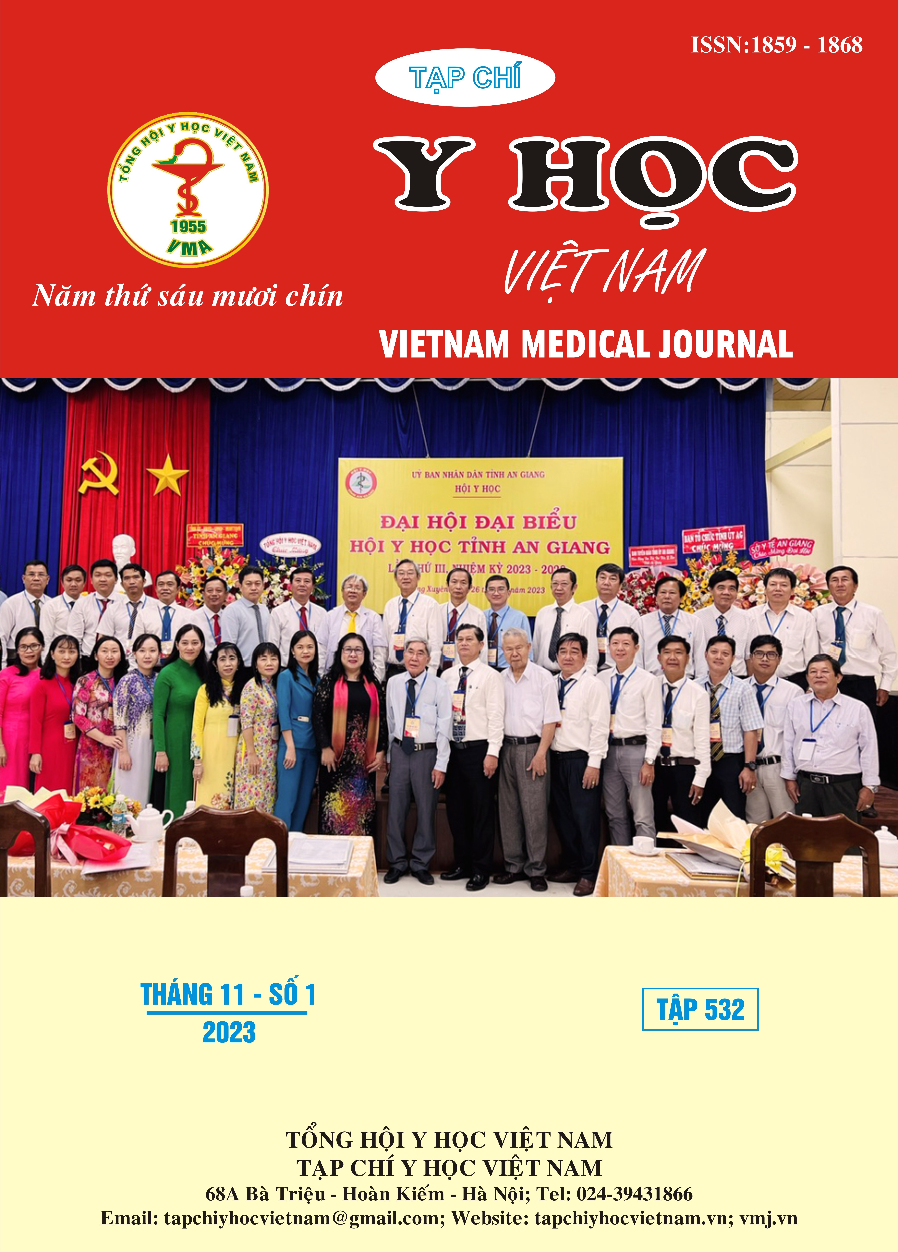THE RESULTS OF FIRST LINE OSIMERTINIB IN UNTREATED EGFR-MUTANT NON- SMALL CELL LUNG CANCER WITH BRAIN METASTASIS
Main Article Content
Abstract
Objectives: Describe some clinical and subclinical characteristics of patients and evaluate the results of first line Osimertinib in untreated EGFR-mutant non-small cell lung cancer patients with brain metastasis in K Hospital from 4/2019 to 7/2023. Patients and methods: A retrospective study on 38 untreated EGFR-mutant non small cell lung cancer patients with brain metastasis were treated with Osimertinib as the first line in K Hospital from 4/2019 to 7/2023. Results: 38 patients enrolled, the average age was 63.61 ± 9.30 years with the ratio of female/male was 2.46. The rate of systemic ORR was 84.2%; the median PFS and iPFS was 14.97 months and 28.63 months respectively. The average OS was 37.32±3.37 months and 30-month survival rate was 62%. In PS 0-1 subgroup, the size of the largest BMs < 3cm subgroup had a longer median PFS and iPFS compared to PS =2, the size of the largest BMs> 3cm subgroup (p <0.005). No difference in PFS and iPFS was observed among the number of BMs, the extracranial lesions, EGFR mutation type and the type of therapy. The most commonly reported adverse events due to any cause were rash (31.5%), diarrhea (28.9%) and dry skin (21%). One patient had to reduce the dosage due to the cardiac adverse effect. No adverse events of grade 3 or higher were observed in our study. Conclusion: The therapeutic of Osimertinib as the first line is highly effective and safe in EGFR-positive non-small cell lung cancer with brain metastasis.
Article Details
Keywords
Non small cell lung cancer, brain metastasis, EGFR mutations, first-line Osimertinib.
References
2. Ramalingam SS, Vansteenkiste J, Planchard D, et al. Overall Survival with Osimertinib in Untreated, EGFR-Mutated Advanced NSCLC. The New England journal of medicine. Jan 2 2020;382(1):41-50. doi:10.1056/NEJMoa1913662
3. Yu F, Ni J, Zeng W, et al. Clinical Value of Upfront Cranial Radiation Therapy in Osimertinib-Treated Epidermal Growth Factor Receptor-Mutant Non-Small Cell Lung Cancer With Brain Metastases. International journal of radiation oncology, biology, physics. Nov 1 2021; 111(3):804-815. doi:10.1016/j.ijrobp.2021.05.125
4. Gen S, Tanaka I, Morise M, et al. Clinical efficacy of osimertinib in EGFR-mutant non-small cell lung cancer with distant metastasis. BMC Cancer. 2022/06/14 2022; 22(1):654. doi: 10.1186/ s12885-022-09741-8
5. Zhai X, Li W, Li J, et al. Therapeutic effect of osimertinib plus cranial radiotherapy compared to osimertinib alone in NSCLC patients with EGFR-activating mutations and brain metastases: a retrospective study. Radiation oncology (London, England). Dec 5 2021;16(1):233. doi: 10.1186/ s13014-021-01955-7
6. Zhao Y, Li S, Yang X, et al. Overall survival benefit of osimertinib and clinical value of upfront cranial local therapy in untreated EGFR-mutant nonsmall cell lung cancer with brain metastasis. International journal of cancer. Apr 15 2022;150(8):1318-1328. doi:10.1002/ijc.33904
7. Ng TL, Camidge DR. AURA 3: the last word on chemotherapy as a control arm in EGFR mutant NSCLC? Annals of translational medicine. May 2017;5(Suppl 1):S14. doi: 10.21037/ atm.2017.03.73


